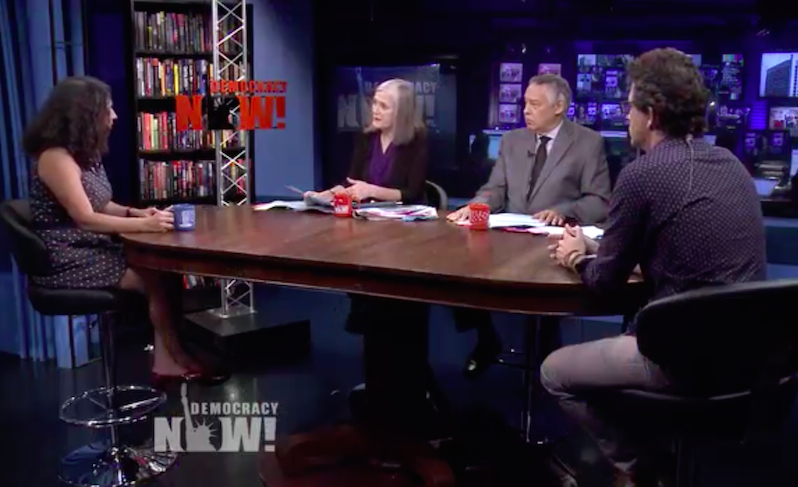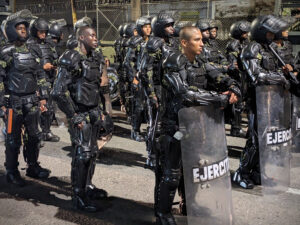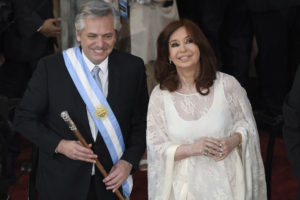Big Political Problems Remain Unresolved in Colombia Despite Historic Cease-Fire
Human rights experts from Colombia explain that although the peace agreement with the rebel group FARC is a milestone, issues of “transitional justice” still plague the country. Among these is addressing the sexual violence that occurred over the years.
Amid a week of political instability across Latin America, many were heartened to learn of Thursday’s signing of a historic peace agreement for Colombia. After more than half a century of armed conflict, the Colombian government and the Revolutionary Armed Forces of Colombia (FARC) agreed on a cease-fire. Colombia’s President Juan Manuel Santos stated that “the end of the conflict has arrived.”
The peace document was signed in Havana.
Many human rights issues remain unresolved in the conflict-torn country. On a recent Democracy Now! interview, Colombian human rights advocates Mario Murillo and Adriana Benjumea joined hosts Juan González and Amy Goodman for a discussion of the peace deal.
Murillo and Benjumea acknowledged that the cease-fire was “a major event,” but both pointed to human rights violations that have yet to be addressed. “[T]here’s plenty of evidence that this ongoing armed violence is going to continue, you know, until a lot of issues are resolved in the countryside,” Murillo said. He continued:
Once the FARC—as the FARC are agreeing to the accord, the Congress has to take up a number of issues, particularly the issues of justice and transitional justice … legislation has to be passed regarding who is going to be able to receive the so-called amnesty, right? [So] that’s where a lot of the criticism is coming in about the peace accord: Is this an impunity for, you know, years of violence and so-called terrorism? But it looks like the combatants who were not involved in crimes against humanity, the combatants will get amnesty and become part of the political life. There’s still uncertainty as to what will happen to those who are implicated in massacres and in crimes against humanity on the ground—an issue that human rights groups are concerned about.
Benjumea raised a specific concern: sexual violence against Colombian women. “[A] very important progress for justice for women would be to see to it that sexual violence committed by the actors in the armed conflict not be subject to amnesty or pardoned,” she said. However, she explained, there are difficulties in processing such crimes. “For a crime such as sexual violence, it’s very difficult for women to testify about this and girls to testify about it,” she said. “[S]o there are complications for it to be judged, and for the Colombian government to have the ears to hear the victims and to make a commitment to see to it that sexual violence [is] not … something that is tolerated in time of war or in peacetime.”
Both were happy about the peace accord, but they cautioned against being overly optimistic. For example, Murillo explained how the Colombian government still represses environmental activists. “[O]n the one hand, the peace accords have a very progressive, very optimistic and lofty, ambitious goals,” Murillo said. But, he noted, the Colombian government is “cozy” with the mining and agricultural industries, and as a result the government opposes activists who are “trying to draw attention” to the issue.
Benjumea expressed a hopeful outlook on Colombia’s evolving politics. “I expect that the political party formed by those who leave the guerrilla struggle will be a major party [so] that we can all build democracy in Colombia together,” she said, “[and] that the debate is no longer going to be waged with weapons, but, rather, within the bounds of politics.”
Watch the full interview below.
—Posted by Emma Niles
Your support matters…Independent journalism is under threat and overshadowed by heavily funded mainstream media.
You can help level the playing field. Become a member.
Your tax-deductible contribution keeps us digging beneath the headlines to give you thought-provoking, investigative reporting and analysis that unearths what's really happening- without compromise.
Give today to support our courageous, independent journalists.








You need to be a supporter to comment.
There are currently no responses to this article.
Be the first to respond.